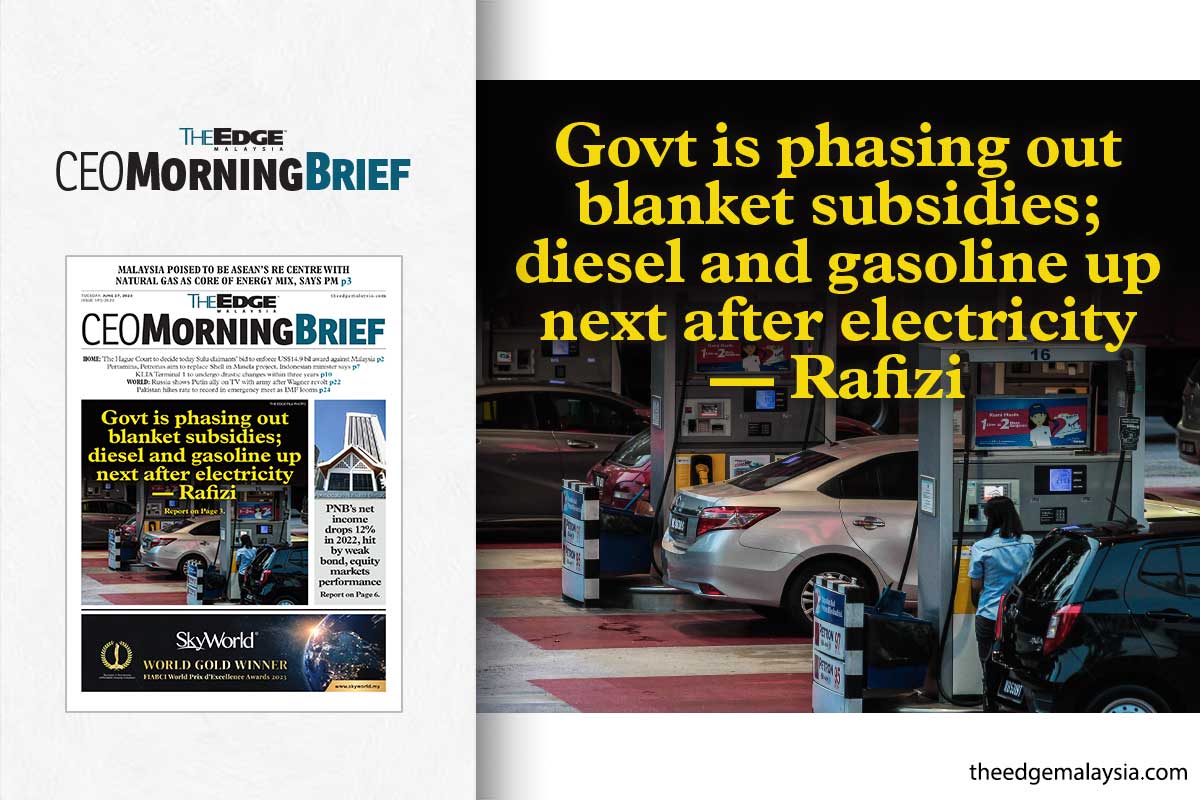
KUALA LUMPUR (June 26): The government is gradually phasing out the blanket subsidy system in favour of a targeted subsidy system, said Economy Minister Rafizi Ramli.
“It is not an easy task,” Rafizi told a panel discussion at the Energy Asia 2023 conference here, to bring everyone on board with the plan.
“But the government has been doing it. I feel very comforted as we have taken that step — targeted electricity subsidy, that has been done. We will move to diesel and gasoline subsidies next,” he said.
Malaysia, which for the most part is a net producer of oil and gas (O&G), has been footing billions in subsidy bills in recent years to keep prices low for electricity and vehicle fuels.
This has dis-incentivised the adoption and development of renewable energy such as solar, although the government has now taken steps to encourage take-up by introducing zero upfront-cost residential solar installation at a small scale, as well as to open up the power market for renewable energy exports to part-fund local RE (renewable energy) projects from the proceeds.
The country is expected to see rationalisation of subsidies in the petrol and diesel space as early as next year, as public discussions continue on the right mechanism that needs to be in place to ensure the implementation does not impact the low-income households.
“But it is also a challenge to strike a balance between financing and capability. There is the debate on whether to take a phase-out approach (absolute zero emissions from fossil fuels) or phase-down approach (building up carbon capture or offset capabilities),” Rafizi said.
“While we must expedite the development of cleaner fuels, we need to be working on these efforts within the framework of gas as a transition fuel. It will allow us in the next 20, 25 years to ramp up our renewable capacity, not just for domestic consumption but also building a renewable [hub] in Asean,” he added.
'Right incentives' needed for Malaysia to move away from fossil fuel
At this juncture, the country needs to provide the right incentives for the society to move in phases away from fossil fuels and towards green energy as part of the energy transition, said Rafizi.
Malaysia needs to ensure that it is able to leverage its existing strength in O&G and other industries to bring the right capabilities to the markets, build a green economy, and push the energy transition.
“A just transition has to strike a balance between sustainability with affordability and availability,”Rafizi said.
“In an economy like Malaysia, we have to plan everything, so there will be phase-by-phase transition. To ensure that, right financing and right fiscal policy towards that (are needed), with the right incentives for society to move in phases away from fossil fuels and more towards green energy…
“At the end of the day, the public has to feel the change of energy transition; they need to appreciate that we are managing the climate risks and at the same time, they need to be part of the economy,” he added.
Read also:
Malaysia poised to be Asean’s renewable energy centre with natural gas as core of energy mix, says PM
Talk of no new oil investments ‘will only lead to energy chaos’, says Opec sec gen
Standard emission disclosures the key as banks shun O&G projects, say O&G players
2022 gas price hike proof that energy affordability is fundamental for RE transition, says TotalEnergies CEO
Pertamina, Petronas aim to replace Shell in Masela project, Indonesian minister says
Move to targeted subsidies part of effort to shift away from low-cost model, says Nik Nazmi
Don’t be distracted by unrealistic net zero by 2050 goal, says energy strategist
Carbon pricing ‘missing ingredient’ in energy transition, but trajectory needs to be managed — Tengku Taufik
Economic developments overshadow geopolitics in energy markets, says S&P vice chairman
Saudi Aramco sees ‘sound’ oil outlook for 2H2023 on China, India demand
